Imagine walking through a city that has been a hub of culture and trade for thousands of years. Damascus, with its rich history, offers a unique blend of ancient traditions and modern vibrancy.
This ancient city has been a key stop on the historic Silk Road, a route that once connected the East and West. Over time, Damascus has been shaped by various rulers, each leaving their mark on its architecture and cultural heritage.
As you explore this fascinating world heritage site, you’ll have the chance to experience the city’s bustling markets, historical landmarks, and delicious local cuisine. Whether you’re interested in history, culture, or simply enjoying a new experience, Damascus has something to offer.
Discovering the Ancient City of Damascus
As you step into Damascus, you’re immediately enveloped in the rich tapestry of history that defines this ancient city. With a history that spans thousands of years, Damascus is a place where the past and present blend seamlessly.
A Brief History of One of the World’s Oldest Cities
Damascus has been continuously inhabited since the 3rd millennium BC, making it one of the oldest continuously inhabited city in the world. Its strategic location made it a prized possession for various empires throughout history, from the Romans to the Ottomans.
The city’s historical significance is evident in its heritage sites, which include ancient mosques, churches, and madrasas. These landmarks not only reflect the city’s rich history but also its cultural diversity.
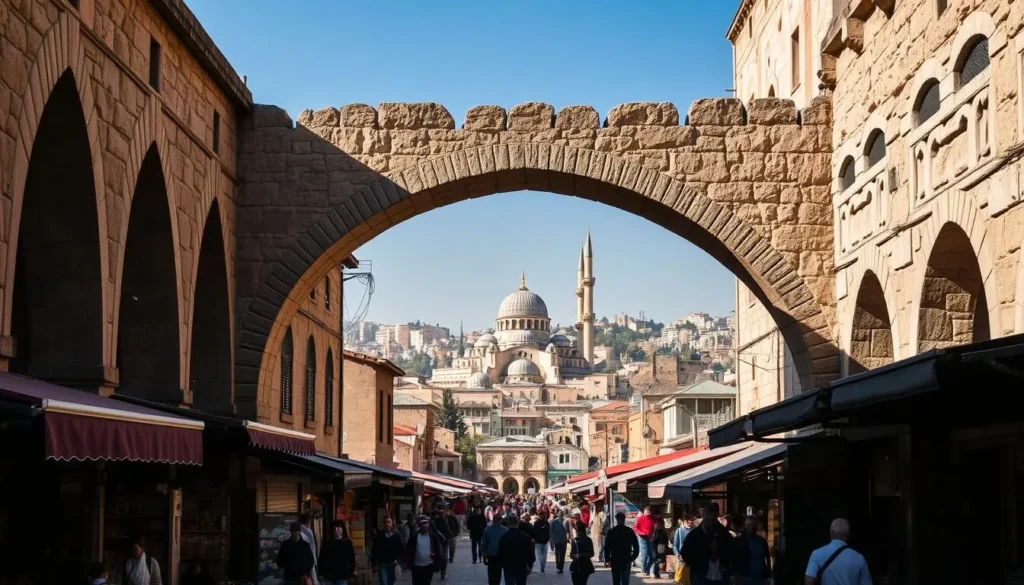
Damascus: The Cultural Heart of Syria
Today, Damascus remains the cultural heart of Syria, preserving traditions and ways of life that have endured for generations. The city’s old town is a testament to its rich culture, with traditional Damascene houses featuring inner courtyards and fountains.
Local artisans continue to practice traditional crafts, including metalwork, woodcarving, and textile production, maintaining Syria’s rich cultural heritage.
| Aspect | Description |
|---|---|
| Historical Significance | Damascus is one of the oldest continuously inhabited cities, with a history dating back to the 3rd millennium BC. |
| Cultural Heritage | The city preserves traditional crafts and ways of life, showcasing its rich cultural heritage. |
| Landmarks | Damascus is home to numerous historical landmarks, including ancient mosques, churches, and madrasas. |
Is Damascus Safe to Visit in 2023?
As you plan your trip to Damascus, the question of safety is likely on your mind. The Syrian capital, with its rich history and cultural significance, attracts many travelers. However, it’s crucial to understand the current safety situation to make informed decisions about your travel plans.
Current Safety Situation
Since 2018, it has been mandatory to organize your trip to Syria with a local tour operator. This regulation is in place to ensure a smooth and safe experience for travelers. Reputable agencies like Golden Team Syria handle necessary permits, transportation, and guide services, making your journey hassle-free.
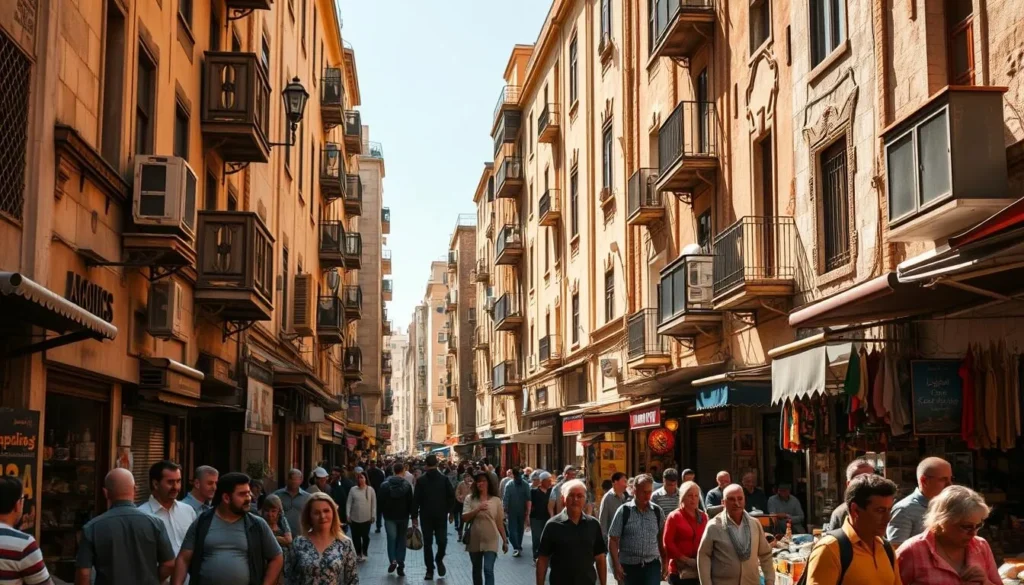
Travel Insurance and Precautions
When traveling to Damascus, it’s essential to have the right travel insurance. SafetyWing’s Nomad Insurance is a great option, offering coverage for up to 365 days, low rates, and excellent support. Additionally, follow your guide’s advice on photography and restricted areas, maintain copies of important documents, and stay informed about local conditions to ensure a safe and enjoyable trip.
To further enhance your safety, consider the following precautions: work with licensed tour operators, select insurance policies that cover emergency medical expenses, and register with your country’s embassy before your trip.
Best Time to Visit Damascus
To make the most of your trip to Damascus, it’s essential to know the ideal time to explore its historical sites.
Damascus, being a city with a rich history, experiences a varied climate throughout the year. Understanding the weather patterns is crucial for a comfortable visit.
Seasonal Weather Patterns
The city’s climate is characterized by hot summers and mild winters. Temperatures can soar during the summer months, making sightseeing challenging.
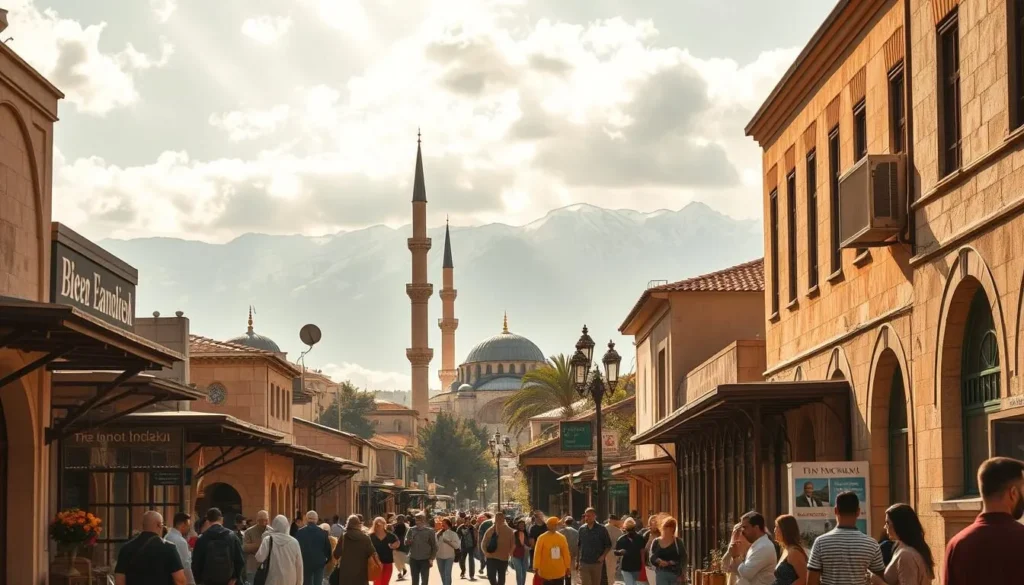
Ideal Months for Sightseeing
The ideal time to visit Damascus is during the spring (March to May) when temperatures range from 15-25°C (59-77°F), providing perfect weather for exploring outdoor sites.
- Spring (March to May) offers pleasant temperatures, ideal for sightseeing.
- Autumn (September to November) is another excellent period, with comfortable temperatures and fewer crowds.
- These seasons allow for extended exploration without the discomfort of extreme temperatures.
- During Ramadan, the city’s rhythms change, with many restaurants closed during daylight hours, but evening hours become vibrant with festive meals.
- Consider planning your visit around cultural festivals or events that showcase Damascus’s rich traditions.
How to Get to Damascus
Getting to Damascus can be a straightforward process if you plan ahead. You have several options to consider when traveling to this ancient city.
Flying to Beirut and Crossing the Border
One common way to reach Damascus is by flying into Beirut, Lebanon, and then crossing the border into Syria. This option allows you to experience the culture of another country before arriving in Damascus. You can take a taxi or bus from Beirut to the border, and then continue on to Damascus.
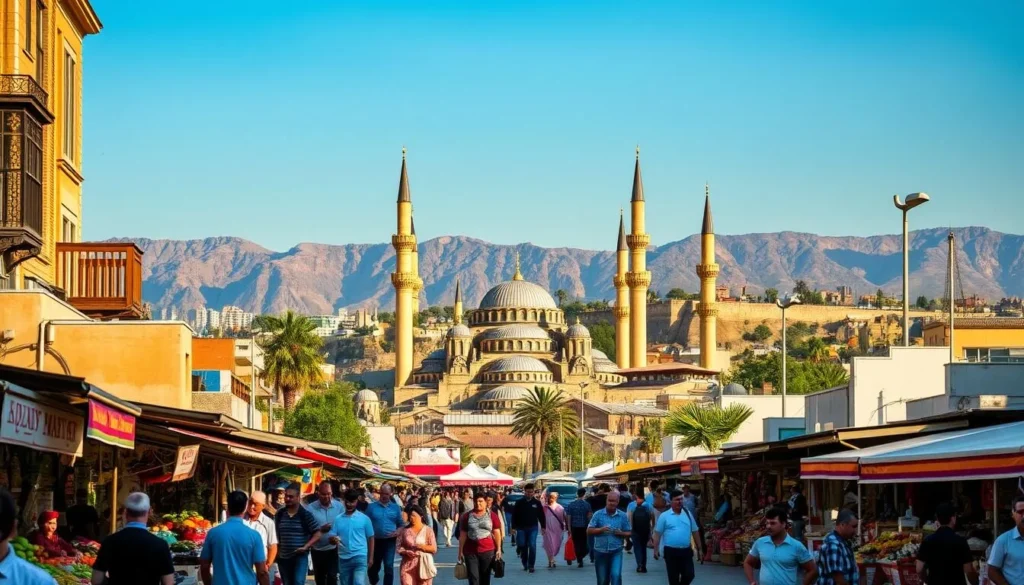
Travel Costs and Budget Considerations
Damascus is an affordable destination, offering great value for budget-conscious travelers. You can enjoy a traditional meal for $15-$20, and a sandwich will cost around $1-2. Accommodation options range from budget-friendly guesthouses to luxury hotels.
| Expense | Cost |
|---|---|
| Traditional meal for 3-4 people | $15-$20 |
| Sandwich | $1-2 |
| Budget guesthouse per night | $10-$30 |
With its affordable prices, Damascus is an excellent choice for travelers looking to experience the rich history and culture of Syria without breaking the bank. You can enjoy your experience in this city, savoring local food and exploring the city on a budget.
Where to Stay in Damascus
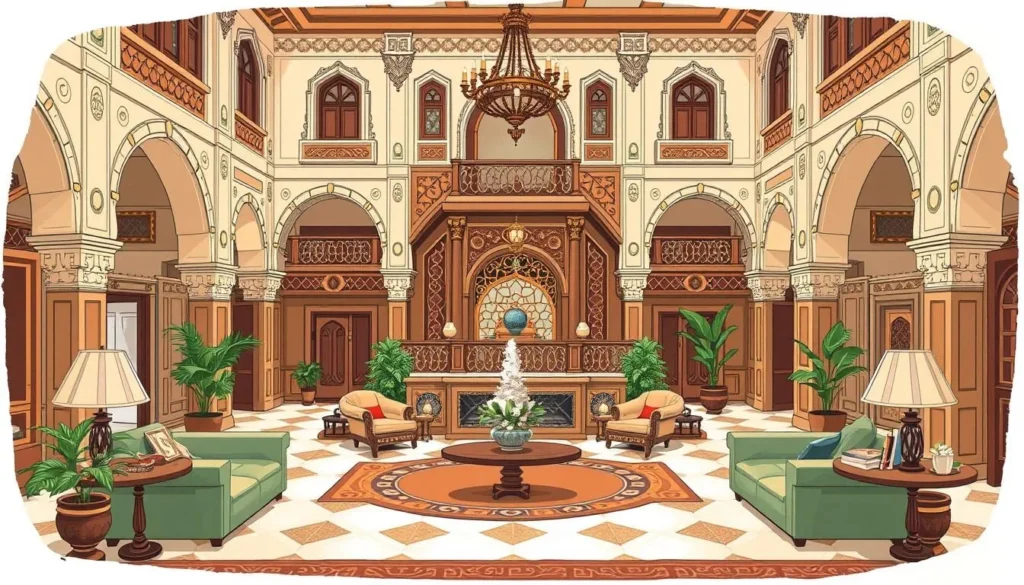
From luxury hotels to budget-friendly guesthouses, Damascus provides a wide array of options for travelers to stay and experience the city’s rich heritage. Whether you’re looking for a cozy boutique hotel or a luxurious resort, Damascus has something to offer every kind of traveler.
Accommodation Options for Every Budget
Damascus caters to a wide range of travelers with its diverse accommodation options. You can choose from luxury hotels like the Four Seasons Hotel Damascus, which offers premium amenities including an outdoor pool and spa. For a more traditional experience, boutique hotels such as Beit Al Mamlouka and Beit Zaman provide intimate settings within restored historical buildings, allowing you to immerse yourself in Damascene architecture.
Luxury and Boutique Accommodations: For those seeking a luxurious experience, hotels like the Four Seasons offer top-notch amenities. Boutique hotels, on the other hand, provide a unique, culturally rich experience.
Recommended Hotels and Guesthouses
Some standout options include the Antique Khan Hotel near the old town, known for its cozy, traditional interior and spacious rooms with excellent air conditioning. For budget travelers, guesthouses like Beit Rumman and Damascus Hostel offer affordable stays with authentic local character.
Traditional Breakfast Experiences: Many accommodations in Damascus include traditional Middle Eastern breakfasts, featuring fresh bread, local cheeses, olives, jams, and hot tea – a delicious start to your day of exploration.
When choosing where to stay in Damascus, consider what kind of experience you’re looking for. Whether it’s luxury, cultural immersion, or budget-friendliness, Damascus has a wide range of hotels and guesthouses to suit your needs.
Essential Arabic Phrases for Travelers
When traveling to Damascus, learning a few essential Arabic phrases can greatly enhance your experience. It shows respect for the local culture and can lead to more meaningful interactions with the people you meet.
Basic Greetings and Expressions
Starting with basic greetings like “Marhaba” (hello) and “Shukraan” (thank you) can go a long way. These simple expressions are appreciated by locals and can make your interactions smoother. You can also use phrases like “As-salamu alaykum” (peace be upon you) as a greeting, which is commonly responded to with “Wa alaykum as-salam” (and upon you be peace).
Useful Phrases for Shopping and Dining
When exploring Damascus’s vibrant markets and dining at local restaurants, knowing specific phrases can be very helpful. For instance, “Kam howa?” means “how much is it?” and is essential for shopping. You can also say “Hada lazeez” to express that your food is delicious. 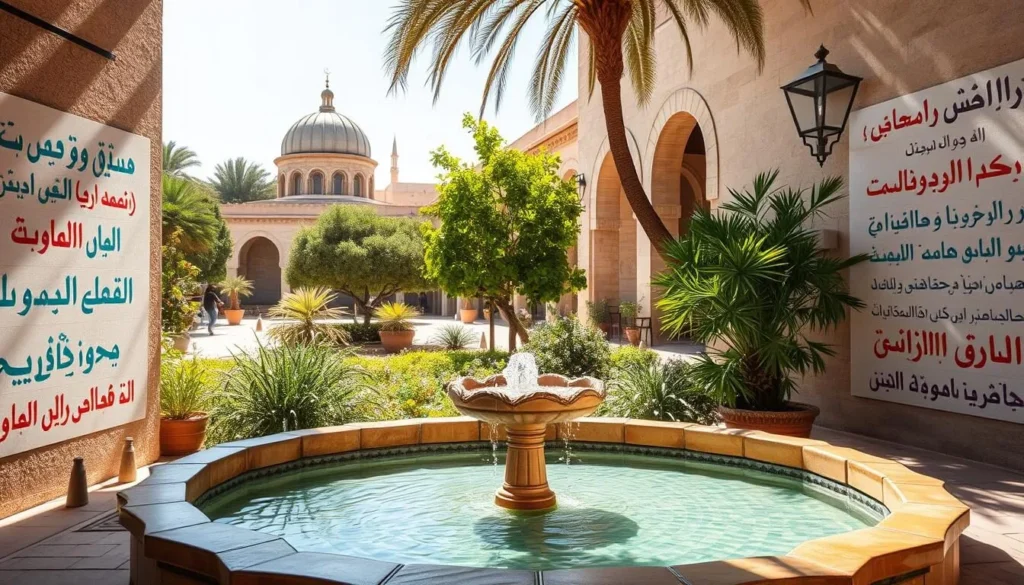 Phrases like “Ayna…?” (where is…) can help you navigate the city and find what you’re looking for.
Phrases like “Ayna…?” (where is…) can help you navigate the city and find what you’re looking for.
By using these phrases, you’re not only making your trip more enjoyable but also showing respect for the local culture, which can lead to a more authentic experience.
Damascus, Syria: Best Things to Do – Top Picks
Damascus, one of the oldest continuously inhabited cities in the world, is a treasure trove of historical sites and cultural experiences. As you explore this ancient city, you’ll discover a rich tapestry of history that spans centuries, with numerous landmarks that reflect its diverse civilization.
Exploring the UNESCO-Listed Old City
The Old City of Damascus, a UNESCO World Heritage Site, is a must-visit destination for any traveler. As you wander through its narrow streets, you’ll encounter a plethora of historical sites, vibrant markets, and cultural landmarks. The Old City is home to some of Damascus’s most significant attractions, including ancient mosques, churches, and traditional souks.
Must-Visit Historical Landmarks
Damascus is home to an array of significant sites that reflect its long history and diverse civilization. Here are some of the key historical landmarks that define the city:
| Landmark | Description | Historical Significance |
|---|---|---|
| Umayyad Mosque | One of the most important Islamic landmarks in the world, built during the reign of Caliph Al-Walid ibn Abd al-Malik. | Represents one of the world’s most important Islamic landmarks with its stunning architecture and spiritual significance. |
| Citadel of Damascus | Dating back to the Ayyubid era, it features high walls and defensive towers overlooking the old city. | Historically served as a military stronghold, offering visitors impressive defensive walls and towers that have protected the city for centuries. |
| Bab Touma | One of the most famous gates of Old Damascus, known for its stone design. | Leads to a district rich in cultural cafés and traditional shops, serving as a portal to different historical eras. |
| Bab Sharqi | Among the remaining gates from the Roman wall, this historic structure preserves part of the city’s architectural memory. | One of the few remaining sections of the original Roman walls, offering a glimpse into the city’s rich heritage. |
These landmarks collectively tell the story of Damascus’s evolution through different civilizations, with each site offering unique architectural features and historical significance that help visitors understand Syria’s rich heritage.
The Magnificent Umayyad Mosque
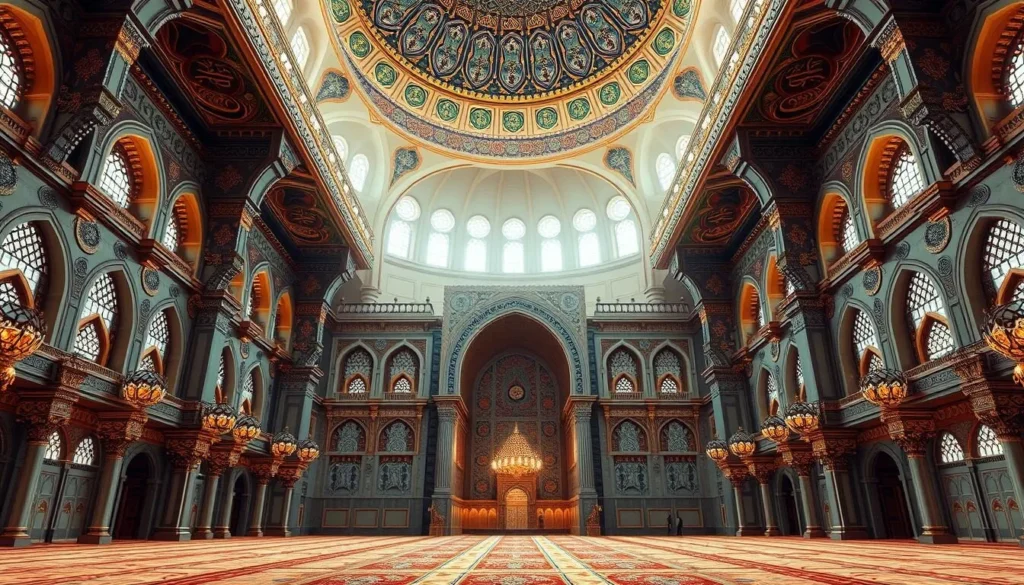
As you step into the Umayyad Mosque, you’re immediately enveloped in the spiritual and historical essence of Damascus. This magnificent structure is not only a significant religious site but also a testament to the city’s rich history that spans centuries.
Architectural Marvels and Religious Significance
The Umayyad Mosque is renowned for its stunning architecture, which includes a massive prayer area where locals gather for prayers, especially during Islamic holidays like Ramadan. The mosque’s design is a blend of traditional Islamic elements and the influence of various cultures that have interacted with Damascus over the centuries, making it a unique mosques that attracts people from all over the world.
The Tomb of John the Baptist and Saladin’s Mausoleum
One of the most significant sites within the Umayyad Mosque is the tomb of John the Baptist, revered in both Christian and Islamic traditions. The tomb is housed in an impressive marble structure adorned with beautiful calligraphy, signifying its importance across different faiths. Nearby, the mausoleum of Saladin, the 12th-century Muslim leader known for his role in the Crusades, offers a serene space for reflection on history and the passage of time.
The Umayyad Mosque’s significance extends beyond its religious importance; it’s a symbol of the shared cultural heritage of Damascus, reflecting the city’s role as a crossroads of civilizations. As you explore this magnificent mosques, you’ll gain a deeper understanding of its history and the people who have revered it for centuries.
Traditional Markets and Shopping Experiences
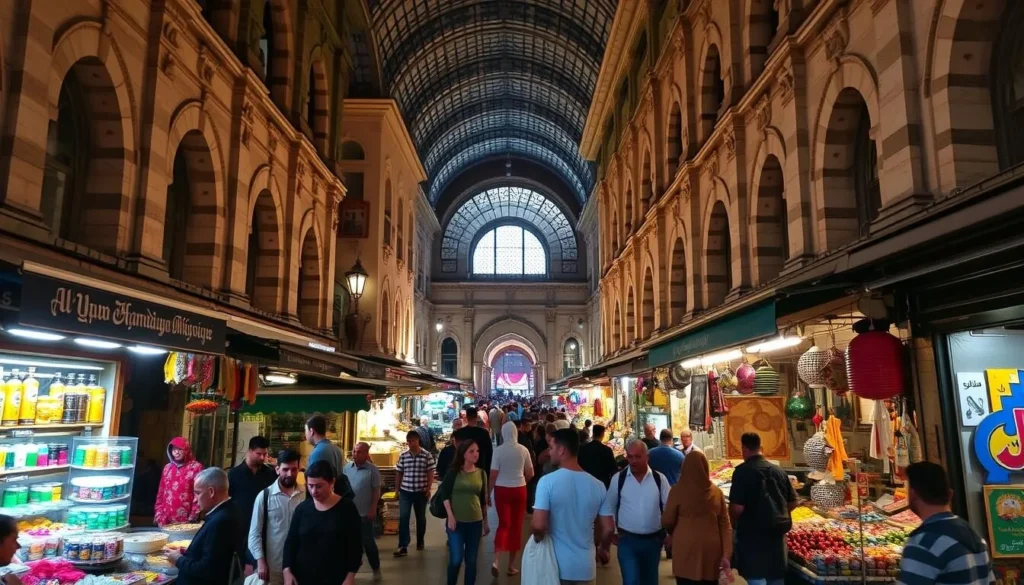
As you wander through the historic streets of Damascus, the vibrant atmosphere of its traditional markets is sure to captivate you. The city is home to numerous bustling souks, with Al-Hamidiyah Souq being one of the most famous.
Al-Hamidiyah Souq: The Historic Covered Market
Al-Hamidiyah Souq, located near the Umayyad Mosque, is a historic covered market that has been a hub of commercial activity for centuries. This iconic souk is a must-visit destination for anyone looking to experience the authentic charm of Damascus. As you navigate through the crowded alleys, you’ll be surrounded by the enticing aromas of local delicacies and the sounds of lively haggling.
What to Buy: Souvenirs and Local Crafts
When it comes to shopping in Damascus, you’ll find a wide range of unique souvenirs and local crafts to take back home. Some popular items include intricately crafted Damascene boxes, authentic Syrian textiles, and an assortment of local spices like za’atar and sumac. You can also pick up handmade olive oil soaps and delicious Syrian sweets, such as baklava and candied nuts, making for perfect gifts or personal mementos.
The traditional markets of Damascus offer a shopping experience that is both memorable and enriching. As you explore the various souks, you’ll have the opportunity to interact with the friendly locals and gain a deeper understanding of Syrian culture.
Cultural and Historical Sites
As you explore Damascus, you’ll discover a wealth of cultural and historical treasures that reflect the city’s rich past. The city’s historical significance is evident in its many landmarks, which have been preserved over the centuries.
The Azem Palace and Khan As’ad Pasha
The Azem Palace is a stunning example of 18th-century architecture, showcasing the intricate craftsmanship of the era. This historic palace has been converted into a museum, offering insights into the lives of Damascus’s elite during the Ottoman period. Nearby, Khan As’ad Pasha is one of the oldest and most impressive caravanserais in the city, featuring a blend of traditional and Islamic architecture.
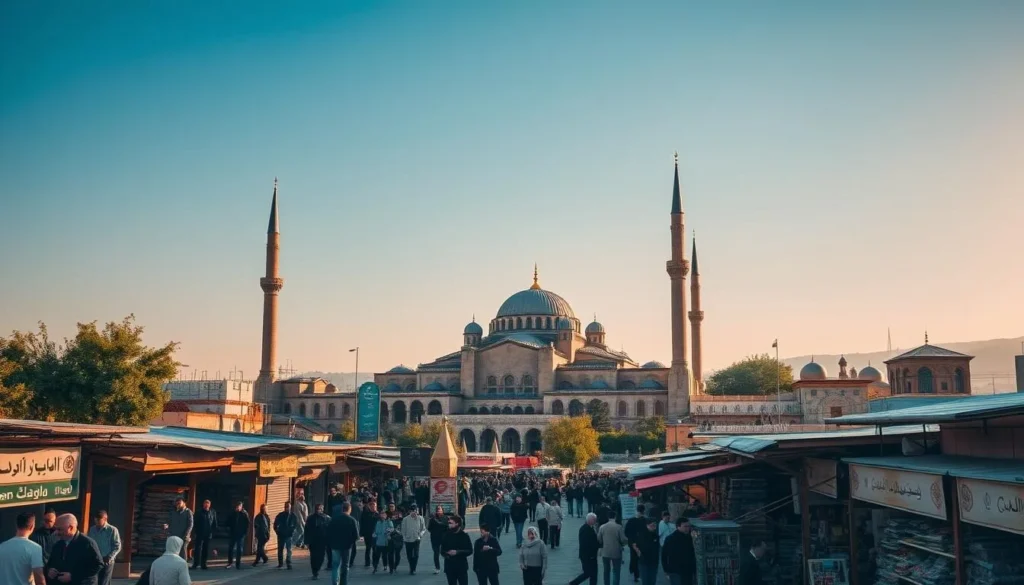
Damascus Citadel and Ancient Gates
The Damascus Citadel, dating back to the Ayyubid era, stands as a testament to the city’s strategic importance. Its high walls and defensive towers provided protection during tumultuous times. You can explore the citadel’s interior courtyards, military chambers, and climb its walls for panoramic views of the city.
- The ancient city gates, such as Bab Touma and Bab Sharqi, are among the few remaining elements of Damascus’s original Roman-era walls.
- Bab Sharqi, constructed during Roman times, marks the eastern entrance to the old city and leads to the historic Christian quarter.
- These defensive structures tell the story of Damascus’s significance among ancient cities and its need for protection throughout history.
Visiting these sites provides a glimpse into Damascus’s rich history and cultural heritage, making your trip a memorable experience.
Culinary Delights of Damascus
When visiting Damascus, you are in for a treat with its diverse and flavorful cuisine. The city offers a wide range of traditional Syrian dishes that are sure to delight your taste buds.
Traditional Syrian Cuisine
Syrian cuisine is known for its rich flavors and aromas, often featuring ingredients like olive oil, garlic, and fresh vegetables. Traditional dishes include kebabs, falafel, and various mezze plates. The cuisine is a reflection of the country’s cultural heritage, with influences from different parts of the Middle East.
Key ingredients in Syrian cooking include fresh herbs, spices, and olive oil, which give the dishes their distinctive flavors. Many recipes have been passed down through generations, making the culinary experience in Damascus truly authentic.
Must-Try Food Experiences Including Bakdash Ice Cream
One of the must-try experiences in Damascus is visiting Bakdash, a famous ice cream shop in the Al-Hamidiyah Souq. Established in 1895, Bakdash is known for its traditional Arabic ice cream made with mastic and sahlab, giving it a unique chewy texture. The most popular flavor is served with pistachios and sweet syrup.
- The shop’s signature ice cream is made with mastic and sahlab, topped with crushed pistachios and sweet syrup.
- Watching the ice cream being made is part of the experience, as workers pound the mixture with wooden mallets.
- Other essential food experiences include sampling fresh-baked bread and trying the city’s renowned pistachio-filled pastries.
![]()
In addition to Bakdash, you can enjoy a leisurely coffee with cardamom at one of the many traditional cafes. Many of these establishments have served generations of Damascus residents, offering a genuine taste of the local culture at all times of day.
As you explore the culinary delights of Damascus, you’ll find that the city’s food scene is a reflection of its rich history and cultural diversity, enjoyed by people from all walks of life.
Day Trips and Adventurous Activities from Damascus
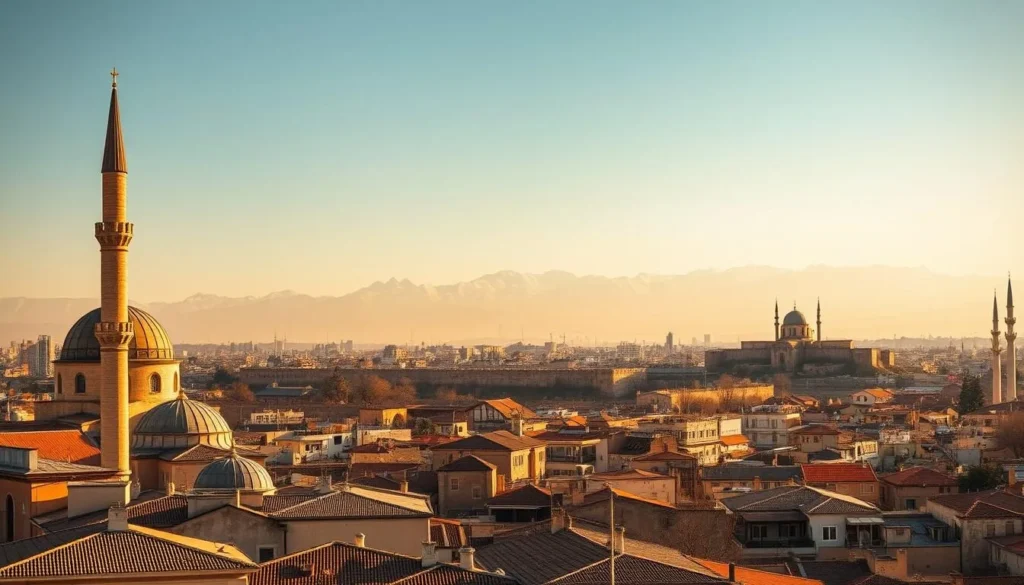
As you explore the historic city of Damascus, you’ll find that there are plenty of exciting day trips and adventurous activities to be enjoyed in the surrounding areas. Whether you’re interested in history, culture, or outdoor adventures, there’s something for everyone.
Hiking in the Anti-Lebanon Mountains
The Anti-Lebanon Mountains offer a great opportunity for hiking and exploring the natural beauty of Syria. With its rugged terrain and scenic views, this region is perfect for outdoor enthusiasts. You can enjoy a range of activities, from leisurely walks to more challenging hikes, and take in the stunning vistas.
Desert Safaris and Cultural Excursions
For those looking for a more adventurous experience, desert safaris are a great option. You can explore Syria’s vast desert landscapes, visit ancient ruins, and enjoy camping under the stars. Tour operators like Egypt Uncovered offer guided tours that include activities such as scuba diving, snorkeling, canoeing, and kayaking, catering to both experts and beginners. Cultural day trips to places like Maaloula, where Aramaic is still spoken, and Bosra, with its remarkably preserved Roman theater, provide a unique insight into Syria’s rich cultural heritage.
These day trips and activities not only enhance your journey but also provide a more comprehensive understanding of Syria’s diverse landscapes and cultural heritage, complementing the urban attractions of Damascus.
Conclusion
Your visit to Damascus will be a journey through time, exploring one of the world’s oldest continuously inhabited cities. With its rich history and warm hospitality, Damascus offers an unforgettable travel experience.
The city’s unique blend of architectural styles, cultural traditions, and culinary delights creates an experience unlike any other destination in the Middle East. From exploring UNESCO World Heritage sites to sampling traditional foods and connecting with local people, Damascus provides countless things to do for travelers seeking authentic cultural immersion.
As tourism gradually returns to this ancient crossroads of civilizations, travelers have a unique opportunity to experience Damascus at a pivotal time in its history. Whether you’re drawn to Damascus for its ancient history, religious significance, culinary traditions, or bustling markets, the city rewards visitors with unforgettable experiences that will stay with you long after your journey ends.
The above is subject to change.
Check back often to TRAVEL.COM for the latest travel tips and deals.
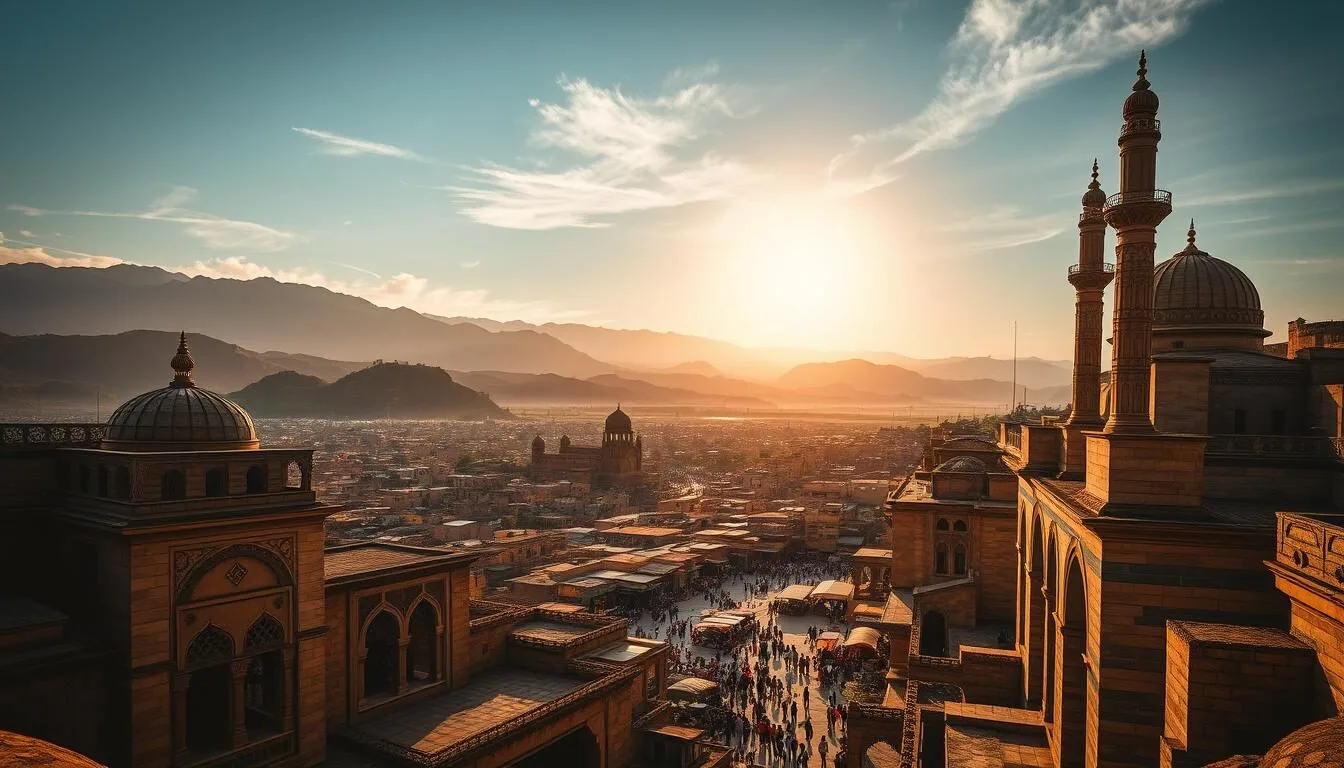

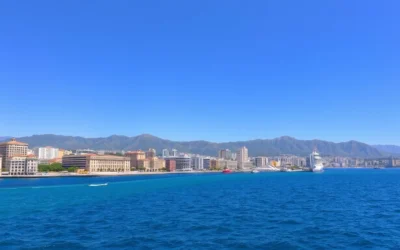

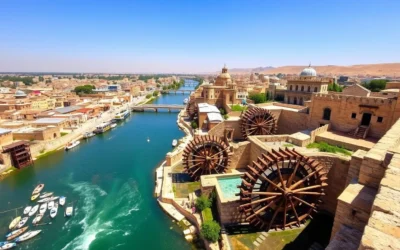
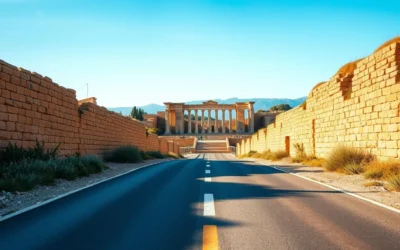

0 Comments